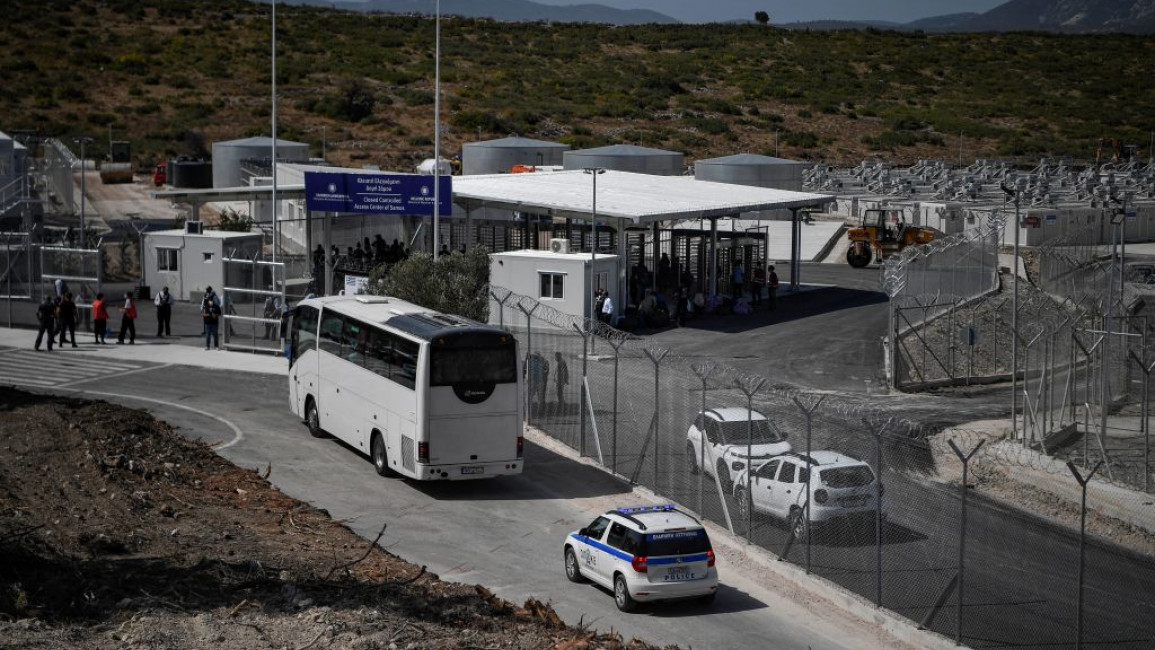MSF slams Greece’s new migrant camp as a 'new prison'
Humanitarian organisation Doctors Without Borders (MSF) has slammed a new multimillion-dollar migrant camp on the island of Samos in Greece.
The camp is one of five new facilities built by the EU - at a cost of around €276 million - in an effort to improve conditions for asylum seekers travelling to Europe.
MSF - who offer medical assistance on the island - warned that the project does not offer a better quality of life for migrants.
"This cannot be sold as an improvement in people's living conditions. Locked up children will play in playgrounds surrounded by barbed wire fences in a remote location completely cut off from the rest of society," Patrick Wieland, MSF Field Coordinator on Samos, told The New Arab.
"What is happening in reality, is that the EU and its leaders are intensifying a policy of violence which is causing a worsening health and protection crisis," said Wieland.
Residents will be allowed to leave the camp, which is equipped with surveillance cameras, x-ray scanners and magnetic doors, between the hours of 8am to 8pm - then the compound is shut for the night.
Around 450 new arrivals on Monday are expected to spend up to 25 days indoors as their documents are examined, according to The Guardian.
MSF told The New Arab they are concerned about the mental health of residents at the new camp.
"The majority of people treated by MSF have experienced one or more traumatic events in their country of origin and during their migration journey," said Betty Siafaka, mental health supervisor in Samos at MSF.
"Their trauma is compounded by their containment and the everyday structural violence of these facilities, such as the new one that has recently been inaugurated in Samos."
Manos Logothetis, who oversees refugee reception at the Greek migration ministry, said there are positives for refugees.
"For the first time in the history of migration, a beneficiary will be able to sit in a restaurant that is air-conditioned and safe," Logoothetis said.
"That's a big change from the long food lines and mud and filth we had before, but yes it is also going to be more regulated, more control."
Many of the residents at the new facility - which has eight restaurants, seven basketball courts, three playgrounds, and a football pitch - will come from a camp near the island's town, Vathy, which at one point held 9,000 people despiting being built for 680.
Greece has often housed large waves of migrants as families travel through the country from conflict-torn areas in the Middle East and North Africa to reach Europe. Many migrants can be stuck in Greece's camps for months, in unhygienic and overcrowded conditions, as EU countries are slow at processing asylum claims.
Greek Prime Minister Kyriakos Mitsotakis and his centre-right government have toughened their stance on migration over the year, relocating refugees to the mainland and building a 25-mile wall on the country's border with Turkey.
There are also reports from Amnesty International of "pushbacks" being used on the Greece-Turkey border as a "de facto policy". The pushbacks are unlawful and often involve violence, said the human rights organisation.



